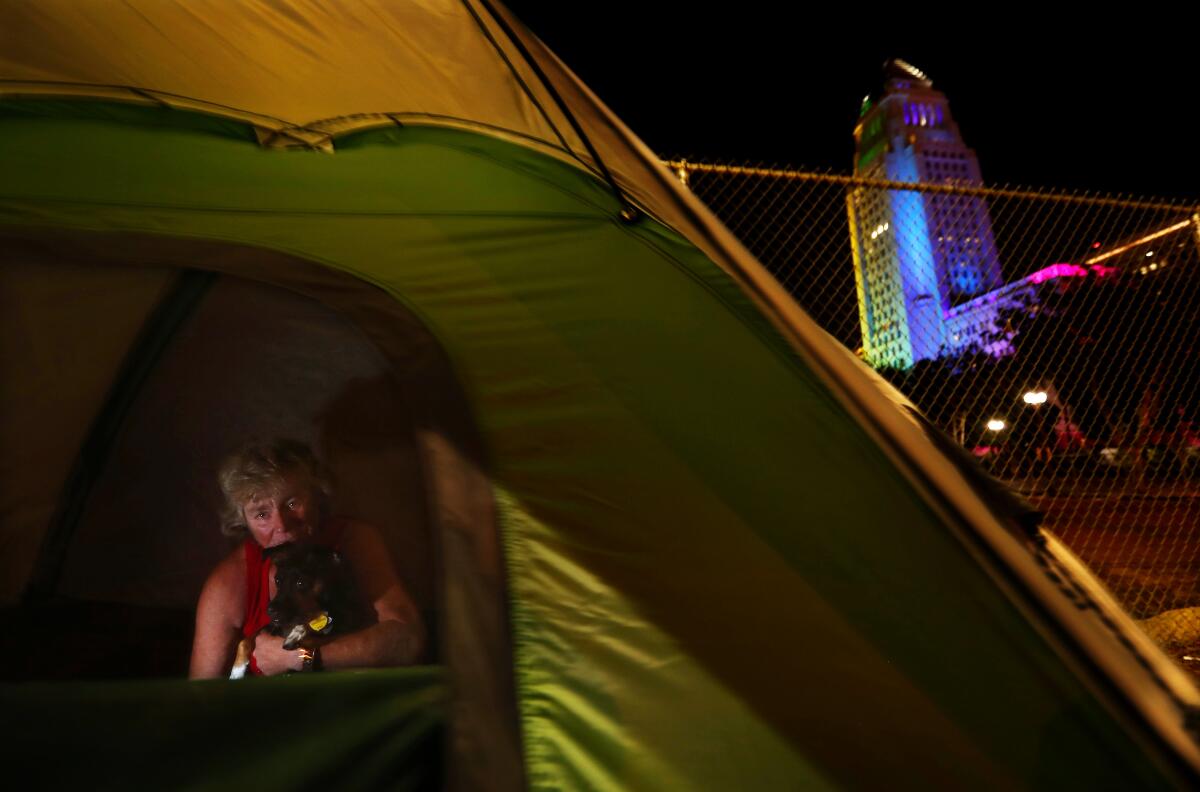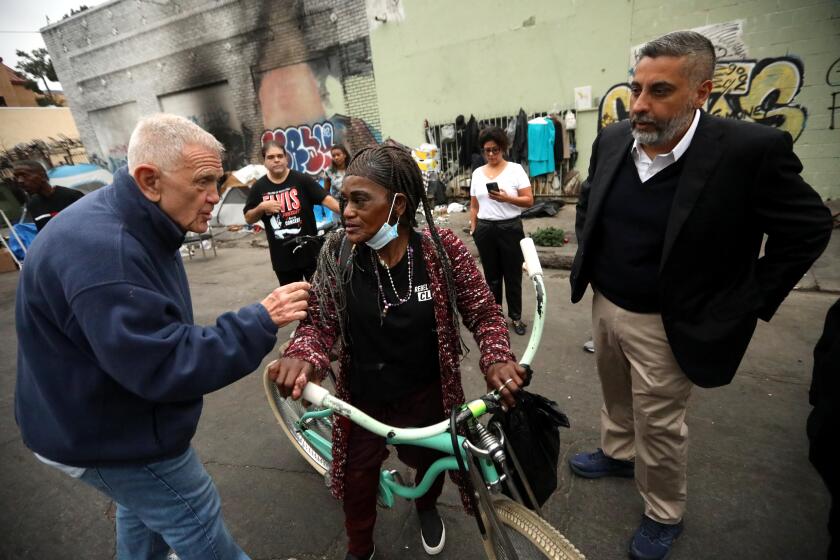L.A. should pay $6.4 million for slow action on cleaning homeless camps, judge is told

- Share via
Alleging more than a year of foot-dragging by Los Angeles officials, lawyers for a group of businesses and residents are asking a federal judge to fine the city nearly $6.4 million over its failure to live up to a nearly 2-year-old settlement agreement to clean up homeless camps.
The request for sanctions comes amid growing tension between the City Council and Mayor Karen Bass over her signature Inside Safe program, which allocates $250 million for outreach and motel rentals to clean up encampments.
Council members have grown concerned that the money going to temporary motel leases does not count toward the city’s commitment in the lawsuit to provide beds through 2027.
Some council members have also objected to where the cleanups have occurred, suggesting the mayor has favored wealthier Westside and West Valley districts over less affluent areas in northeast Los Angeles and the eastern Valley.
Frustration rose to a point last month that Councilwoman Monica Rodriguez and the chief of staff for Councilman Kevin de León walked in uninvited to a negotiating session in a judge’s chambers to see what was being discussed.
The motion, set for a March 7 hearing, alleges that the city repeatedly missed deadlines and negotiated in bad faith over terms of a settlement agreement to shelter at least 60% of people living on the streets in each council district.
Bass, who initially withheld comment on the Feb. 7 motion, blasted it in a statement Wednesday, characterizing it as a money-grabbing distraction from her work on homelessness.
“The City of Los Angeles brought thousands more unhoused Angelenos inside last year than the year before and we will continue that urgent work to save lives no matter what,“ the statement said. “I do not have patience for anyone who stands in the way, and certainly not for those seeking to profit with baseless motions in court.”
The city attorney’s office also assailed the request for sanctions as “unprecedented,” “unbecoming” and “incorrect” in an opposition filed this week.
“Diverting over $6 million in funds from the City’s homelessness budget would undermine the City’s efforts to provide shelter, intervention and other programs to the most vulnerable in the community,” Chief Assistant City Atty. Scott Marcus wrote in the brief.
For more than a year, the motion contends, the city stalled, then tried to back out of the district-by-district commitment as Bass pursued a citywide program to clean up encampments, according to the motion filed by lawyers for the L.A. Alliance for Human Rights.
“The City obstructed efforts to establish critical encampment milestones and created far fewer beds than it promised to,” the motion said. “This was an egregious violation of both the letter and the spirit of the agreement and there must be consequences to ensure that defendants are not emboldened to further ignore their commitments.”
The city disputed that, saying the settlement agreement includes no timeline for the milestones and that it had set the milestones before the motion for sanctions was filed.
The motion also asks U.S. District Judge David O. Carter, who is presiding over the 4-year-old case, to order the city to produce plans within 30 days to clean up what it describes as two “high-acuity areas,” Skid Row and avenues 45 and 59 in Highland Park, which it singled out as examples of low-income areas neglected by Bass’ citywide approach.
After approving a settlement requiring L.A. County to provide 3,000 new mental-health and substance-use treatment beds, Judge David O. Carter staged a test.
Though not large, the two locations in Highland Park “host some of the most dangerous encampments in the city with regular fires (an average of 3 fires per week at Avenue 45), constant drug activity, and major property and violent crime” and “represent the inability and/or unwillingness of the City to direct the same level of encampment reduction energy to this working class neighborhood that it has devoted to the wealthier West Side,” the motion said.
The city contends the alliance is attempting to rewrite the agreement because nothing in it requires the city to focus on specific locations.
The lawsuit, filed in March 2020, named the city and county, alleging that they were both failing in their duty to provide shelter and services for unsheltered people, then estimated to number 26,600 citywide and 44,200 countywide. Those totals have risen to about 32,700 in the city and 55,200 in the county in the most recent count.
The county reached a settlement in September committing to provide an additional 3,000 mental health beds as well as paying for services alongside city beds.
With Eric Garcetti still in the mayor’s office, the city settled much earlier, in June 2022, agreeing to a plan to determine the shelter need within each of the city’s 15 council districts to provide beds for at least 60% of its unsheltered population.
The motion detailed a tortuous series of meetings and negotiations that eventually led to that plan being approved by the City Council last month, 447 days late. The city initially complied with one requirement, committing to produce 12,915 beds by June 2027, but did not satisfy a second element, the number of encampments it would remove in each council district.
According to the chronology in the motion, the new Bass administration initially told the L.A. Alliance it would have service providers in place in each council district and have assessments of each district’s needs by Oct. 1, 2023. The city missed the deadline and instead proposed one encampment cleanup goal for the whole city.
Bass was pursuing her Inside Safe program, which, to date, has cleared more than 30 encampments and placed nearly 2,000 people into interim or permanent housing, according to her office.
In negotiating sessions late last year, the city changed its proposal several times, at one point offering to clear out “a minimum of 12,000 tents, makeshift shelters, cars, vans, and RVs,” but later saying it could commit to moving only 5,300 people out of camps if it stuck to the district-by-district plan, according to the motion.
De León said in a statement that it was “deeply concerning” that city officials “would attempt to renegotiate a settled agreement void of the council’s approval.”
Councilman Bob Blumenfield told The Times he heard rumors early in January that a citywide plan was being pushed and immediately contacted Bass to impress on her his strong opposition to abandoning district goals.
“She assured me that would not be,” Blumenfield said.
On Jan. 6, the city provided what the L.A. Alliance lawyers wanted, a breakdown of 9,800 camp “reductions” broken down by council district and delineated in six-month periods.
But the submission had not been shown to the City Council, which had final say over the settlement agreement. That prompted Rodriguez to walk in on the negotiating session.
The city administrative office presented the proposal to the council in closed session Jan. 31, and the council approved it, bringing the city into compliance.
Attorneys for the L.A. Alliance then filed their motion, saying serious sanctions were necessary. They ask for $100,000 per week for the 447-day period.
“The citizens of Los Angeles lost a year of accountability to the City’s noncompliance and obstructive conduct,” they said.
Blumenfield said he is optimistic that the mismatch between Inside Safe and the L.A. Alliance settlement will be worked out.
“We all have the same goals, the council members and the alliance — getting people housed and camp resolutions,” he said. “Inside Safe is all about reducing encampments.”
Times staff writer David Zahniser contributed to this report.
More to Read
Sign up for Essential California
The most important California stories and recommendations in your inbox every morning.
You may occasionally receive promotional content from the Los Angeles Times.















